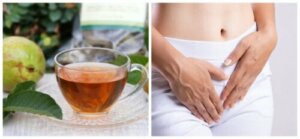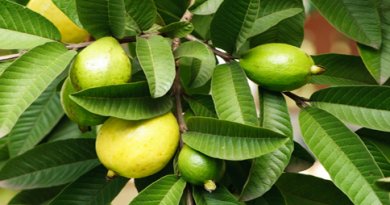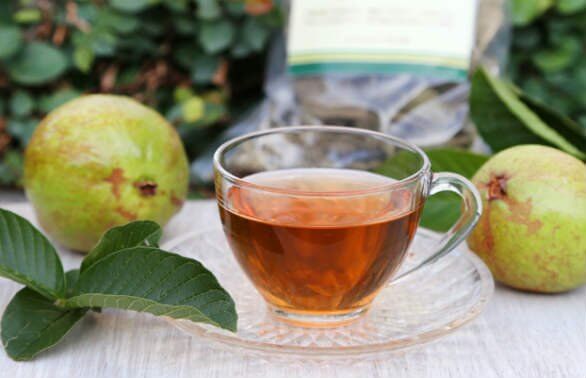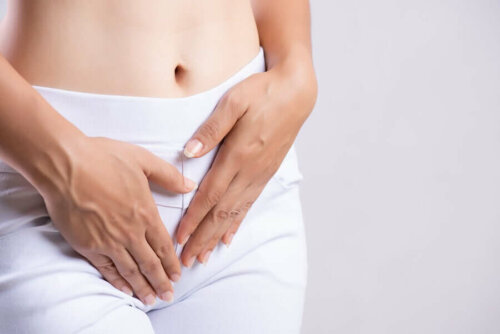Three Guava Leaf Remedies Against Vaginal Discharge

Below we’ll tell you about three guava leaf remedies for excessive vaginal discharge. This is a common problem that women may experience at some point in their lives. It’s called “leucorrhea” and can have a variety of causes, from infections (which are usually the most common causes) to physiological issues.
It’s uncomfortable for many women. Even though it’s not a serious health problem, it influences their quality of life.
When facing this type of discomfort, the best thing to do is to go to the gynecologist for an evaluation and diagnosis. Depending on the diagnosis, your doctor will prescribe one treatment or another.
In addition, there are those who consider they can resort to certain home remedies, from traditional medicine, to alleviate their discomfort and speed up the recovery process. These aren’t usually remedies that have scientific validity, however, there are those who prefer them.
In this article, we’ll share the benefits of guava leaf remedies to reduce the vaginal discharge.
Guava leaves

People don’t just use the fruit, but also other parts of the plant. The leaves, for example, have been attributed several medicinal properties.
The leaves of the guava tree are used to prepare an infusion that’s used both as a hydrating drink and to prepare a sitz bath.
How to use Guava Leaves for Damaged Hair
Three guava leaf remedies for excess vaginal discharge
Guava leaves are an effective remedy to reduce excess vaginal discharge and care for your intimate area.
The leaves are considered to have antibacterial and antifungal properties, which would help fight the infections that are causing the changes in the discharge. People say it has soothing properties, which help relieve itching, inflammation, irritation, and other associated discomfort.
1. Guava leaf tea
Drinking this tea will stimulate urination, which facilitates the expulsion of possible pathogens that may be lodged in the renal system or the female reproductive system.
Ingredients
- 1 c. of water
- 2 fresh guava leaves
Preparation
- First, boil the water and add the guava leaves
- Secondly, cook for 10 minutes and take it off the heat
- Then, allow steeping for 5 minutes
- Drink in moderation

2. Guava leaf sitz bath
There’s no proof that washing the vagina with a guava leaf infusion can help regulate excessive vaginal discharge, although some swear by it.
You can prepare it following the above-mentioned procedure and the warm (or cold) liquid is used to wash the vagina.
However, doctors don’t recommend it, since the liquid can cause irritation and can be counterproductive, aggravating discomfort and further altering the pH of the intimate area.
Learn about these Natural Remedies for Various Menstrual Issues
3. Steam bath
Steam baths are another popular method of regulating excessive vaginal discharge. It isn’t scientifically proven and doctors don’t really recommend it from a medical point of view. However, there are those who say it works.
What does science say?

In 2017, a group of researchers decided to do a review of the effects of guava leaves on health and came to the following conclusions:
- The information available on the effects of guava leaf tea or infusion and dietary supplements is inconclusive
- There are certain phenolic compounds in guava leaves that could help regulate glucose levels, however, this needs to be further explored
- Although people say that guava leaf remedies have multiple applications, there’s no scientific evidence that any of them have the desired effect
- According to a study published in 2019, in rural India, guava leaf remedies are used to treat multiple health problems, not just intimate hygiene
In view of the above, you can say that in order to treat issues such as excessive vaginal discharge, it’s best to consult a gynecologist and follow their instructions. Experts don’t recommend home remedies, since they haven’t scientifically proven their benefits and, in general, they’re risky to use.
Going to the doctor
It’s best to seek medical advice if the vaginal discharge becomes abundant, foul-smelling, grayish, brown, or green, thicker, or more watery than normal.
All cited sources were thoroughly reviewed by our team to ensure their quality, reliability, currency, and validity. The bibliography of this article was considered reliable and of academic or scientific accuracy.
- Daswani, P. G., Gholkar, M. S., & Birdi, T. J. (2017). Psidium guajava: A Single Plant for Multiple Health Problems of Rural Indian Population. Pharmacognosy Reviews, 11(22), 167-174. https://www.ncbi.nlm.nih.gov/pmc/articles/PMC5628524/
- Díaz-de-Cerio, E., Verardo, V., Gómez-Caravaca, A. M., Fernández-Gutiérrez, A., & Segura-Carretero, A. (2017). Health Effects of Psidium guajava L. Leaves: An Overview of the Last Decade. International Journal of Molecular Sciences, 18(4), 897. https://www.ncbi.nlm.nih.gov/pmc/articles/PMC5412476/
- Ferdosh, S. (2023). Ethnobotanical Review of Selected Medicinal Plants in Guam for the Treatment of Urinary Tract Ailments and Their Pharmacological Properties. Scientia Pharmaceutica, 91(3), 43. https://www.mdpi.com/2218-0532/91/3/43
- Jeanmonod, R., Chippa, V., & Jeanmonod, D. (3 de febrero de 2024). Vaginal Candidiasis. StatPearls (Internet). StatPearls Publishing. https://www.ncbi.nlm.nih.gov/books/NBK459317/
- Kumar, M., Tomar, M., Amarowicz, R., Saurabh, V., Nair, M. S., Maheshwari, C., Sasi, M., Prajapati, U., Hasan, M., Singh, S., Changan, S., Prajapat, R. K., Berwal, M. K., & Satankar, V. (2021). Guava (Psidium guajava L.) Leaves: Nutritional Composition, Phytochemical Profile, and Health-Promoting Bioactivities. Foods, 10(4), 752. https://www.ncbi.nlm.nih.gov/pmc/articles/PMC8066327/
- Morais-Braga, M. F., Carneiro, J. N., Machado, A. J., Sales, D. L., Dos Santos, A. T., Boligon, A. A., Athayde, M. L., Menezes, I. R., Souza, D. S., Costa, J. G., & Coutinho, H. D. (2017). Phenolic composition and medicinal usage of Psidium guajava Linn.: Antifungal activity or inhibition of virulence? Saudi Journal of Biological Sciences, 24(2), 302-313. https://www.sciencedirect.com/science/article/pii/S1319562X15002235
- Robert, M. (2019). Second-Degree Burn Sustained After Vaginal Steaming. Journal of Obstetrics and Gynaecology Canada, 41(6), 838-839. https://www.sciencedirect.com/science/article/abs/pii/S1701216318305875
- Sahu, M., Pandey, S., & Bharti, S. (2016). Topical Fruit Apple of the Poor’s People (Psidium guajava L.). International Journal of Life-Sciences Scientific Research, 2(5), 548-551. https://www.semanticscholar.org/paper/Topical-Fruit-Apple-of-the-Poor%E2%80%99s-People-(Psidium-Sahu-Pandey/27e3c964d4718e6f307b5cc2477ee126a44f00b9
- Soliman, F. M., Fathy, M. M., Salama, M. M., & Saber, F. R. (2016). Comparative study of the volatile oil content and antimicrobial activity of Psidium guajava L. and Psidium cattleianum Sabine leaves. Bulletin of Faculty of Pharmacy, Cairo University, 54(2), 219-225. https://www.sciencedirect.com/science/article/pii/S1110093116300242
- WebMD. (2020). Guava – Uses, Side Effects, and More. Consultado el 11 de abril de 2024. https://www.webmd.com/vitamins/ai/ingredientmono-1133/guava
This text is provided for informational purposes only and does not replace consultation with a professional. If in doubt, consult your specialist.








